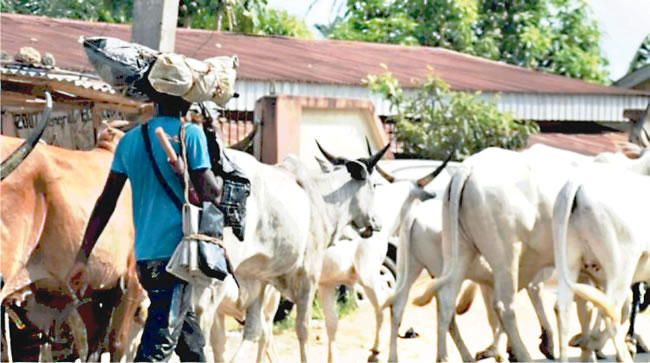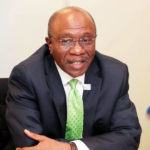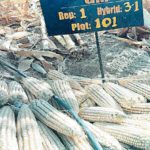The September 1, 2021 deadline set by the Southern Governors Forum (SGF) for the governors of the 17 southern Nigerian states to enact laws banning open grazing in the entire region is a day away. However, while the South-West region appears to be fully committed to the deadline, the same cannot be said of the South-East and South-South sub-regions, where there are misgivings about the sincerity of most of the governors to the deadline. In this piece, ‘SUYI AYODELE, EBENEZER ADUROKIYA, ALPHONSUS AGBOR, ONYEMA GODWIN, INIOBONG EKPONTA, HENDRIX OLIOMOGBE, EBIOWEI LAWAL, GRACE EGBO, MICHAEL OVAT, JOHNKENNEDY UZOMA, IGBONAKA CHUKWU and NNANNA NWOGU, examine the readiness of the two sub-regions to the deadline.
It was a sigh of relief for the people of southern Nigeria, when on Tuesday, May 11, 2021, the 17 governors of the zone gathered in the city of Asaba, capital of Delta State, to chart a new course for the people in the region. The Asaba meeting was particularly significant in the sense that it was the first of such for the Southern Governors Forum, (SGF), considering the far-reaching decisions made. One of such decisions was its resolve to ban, completely, open grazing in the entire southern part of the country. In the last six years, nothing has threatened the unity of Nigeria more than the activities of nomadic herders, whose clashes with farmers, almost on a daily basis, leave on their trails, sorrows, tears and blood. To curb, permanently, such an anomaly, the forum «resolved that open grazing of cattle be banned across Southern Nigeria; noted that development and population growth has put pressure on available land and increased the prospects of conflict between migrating herders and local populations in the South. Given this scenario, it becomes imperative to enforce the ban on open grazing in the South (including cattle movement to the South by foot)».
The reaction from the North was that of total condemnation. The Attorney General of the Federation, AGF, and Minister of Justice, Abubakar Malami, SAN, leading the pack, declared that the decision to ban open grazing by southern governors is unconstitutional. The AGF, who appeared on the Channels Television’s Politics Today Programme said the decision of the governors “does not align with the provisions of the constitution, hence it does not hold water.”
Unfazed by the opposition of the AGF and other northern interests, the SGF called for a review meeting on July 5, in Lagos, where it not only reaffirmed its earlier position on the ban on open grazing in all the parts of Southern Nigeria, but set a September 1, 2021 deadline for the implementation of the ban, by which time, all the 17 states in the southern region, would have completed the process of passing laws in support of the ban. The 17-member SGF is expected to sign the laws by that date. Governor Rotimi Akeredolu of Ondo State, who is the chairman of SGF, said: “We have set a timeline of September 1 for the promulgation of the anti-open grazing law in all member-states.”
While the country waits for the September 1 deadline to happen, a lot of people believed that before the D-Day, some of the governors would have backed out of the arrangement for political reasons. That doubt became a reality, when on August 25, barely six days to the September 1 deadline, Governor Hope Uzondimma of Imo State, broke away from the SGF resolution on open grazing and, instead, opted for “partnership between farmers and herders”.
The governor later clarified his statement by adding that the state already has a similar law promulgated and in use since 2006.
Besides Uzodinma, all eyes were equally on his Ebonyi State counterpart, David Umahi, who having decamped from the opposition Peoples Democratic Party, (PDP), to the ruling All Progressive Congress, (APC), might also toe the same line with Uzodinma. Should that happen, the hope of a united SGF in the fight against open grazing in Southern Nigeria may be a mirage, after all. A review of the preparedness of the SGF for the September 1 deadline on the matter, clearly shows that the two sub-regions of South-East and South-South, may be the sick babies of the SGF. Interestingly, sharp reactions have continued to trail Uzodinma’s posture on the ban of open grazing.
Why Sept. 1 deadline must be implemented—Ohanaeze Ndigbo
First to react was the Ohanaeze Ndigbo, the socio-cultural body for the South-East, which threatened to deal with any Igbo governor supporting open razing in the South-East. The Secretary General of the Igbo group, Mazi Okechukwu Isiguzoro, made the promise on Thursday, while condemning the decision of Imo State Governor Hope Udodinma to support open grazing in his state.
According to Isiguzoro, “Uzodinma cannot afford to face the consequences of his decision. Ohanaeze Ndigbo Worldwide had warned the governor of Imo State on the dangers of withdrawal from the ban on open grazing initiated by the forum of southern governors.
“Our suspicion had been reinforced with the continued absence of Governor Hope Uzodinma in the meetings of southern governors in Asaba and Lagos, which was intentional and premeditated to ambush the resolutions of the southern governor.”
Also, the Ohanaeze Ndigbo Council of Elders, not minding Uzodinma›s stance, declared its support to the SGF on open grazing in the region. The Chairman of the Council, Chief Emmanuel Iwuanyanwu, told Nigerian Tribune in Owerri last Thursday that the government should avoid whatever reason people should trek from Maiduguri to the South-East in the name of grazing.
“If the business of grazing in the country is a lucrative one, why is it that none of their children are not into it? Nigeria is getting worse every day and it is generating a point of causing ethnicity crisis that would result in killing just like it has happened in a peaceful community of Jos, Plateau State. If the southern governors have taken a stand on the open grazing and Governor Uzodimma for whatever reason decided to back out of it, it is a betrayal,” it stated.
Also, the opposition PDP in Imo State described the pulling out of Uzodimma from the SGF agreement on open grazing as “a betrayal of trust”. The party Publicity Secretary, Ogubundu Nwadike told Nigerian Tribune that the party felt disappointed on the action of the governor and expressed surprise that even the Governor. David Umahi of Ebonyi State, who joined the APC recently, had not made any comment on the issue.
Ebonyi: Rumble over alleged FG’s N6bn cattle ranching fund
In Ebonyi State, the rumble is on the revelation that Ebonyi and some other states of the federation had received N6bn each from the Federal Government for cattle ranching in the states. Alaigbo Development Foundation (ADF), the PDP and many other stakeholders in the South-East kicked against the alleged collection of the money by Governor David Umahi.
ADF spokesperson Chief Abia Onyeike, said governor Umahi’s attitude all along had been to act as a quisling to the Igbo nation. Also, the PDP, Ebonyi State chapter through its spokesperson, Silas Onu, questioned the rationality behind the alleged N6 billion received by Ebonyi State government.
Meanwhile, the Ebonyi State Commissioner for Agriculture Chief Moses Ogodo Ali Nome, in a telephone interview with Nigerian Tribune, debunked the statement. According to him, the state did not collect any money for ranching and had no intention of doing so. “We have not collected any money for ranching and we have no intension to collect any money, it’s a gossip. We didn’t propose to give any land for grazing in Ebonyi, there is no intention to do that and we have no intention to do that.”
Checks by Nigerian Tribune revealed that the state government’s plan is to rely on an already existing law passed a few years ago on open grazing. Leo Ọketa, the Chief Press Secretary to the Speaker, Ebonyi State House of Assembly, Ogbonnaya Nwifuru, told our correspondent that “Law No. 010 of 2018: Ebonyi State Miscellaneous Offences Law» passed by the House contains sections which expressively banned open grazing.”
However, on enforcement, the Secretary to the State Government and Coordinating Commissioner, Dr Kenneth Ugbala, said security agencies and other relevant authorities in the state had been charged to ensure strict enforcement of the law banning open grazing and movement of cows within the state.
While Enugu State was not mentioned among the states that received money from the Federal government for ranching, as the state government had continually denied any involvement, the state is slow on the September 1 deadline set by the SGF, of which Governor Ifeanyi Ugwuanyi was a signatory.
We will hold public hearing on ban —Enugu House of Assembly
Contacted on the issue, the Speaker of the Enugu House of Assembly, Edward Ubochi corroborated the executive stand of non involvement of the Federal Government ranching plans, adding that that a public hearing on the Anti Open Grazing Ban on the floor of the House would be held today Tuesday, August 31, just a day to the set date.
In Abia State, the government said it aligned with the SGF’s decision to ban open grazing in their various states. The state Commissioner for Information, John Okiyi Kalu, in an interview in Umuahia with Nigerian Tribune, disclosed that the state had two years ago passed the bill into law, earlier before others recognized the need to regulate open grazing in their states and had acted wisely and promptly. He maintained that “the state government stands by that law”.
Anambra to consider bill after state election
The situation is worse in Anambra, where the House of Assembly only planned to deal with the bill in November. Confirming whether the anti open grazing law had been forwarded to the legislative house for debate, the lawmaker, representing Orumba North and Deputy Majority leader of the house, Emeka Aforka, in a telephone interview, said the House was on it; and that full attention would be given to the bill, shortly after the November 6th, 2021 governorship election in the state. This in essence means if all other states in the SGF begin implementation on September 1, Anambra will not be part of it.
This was just as the Anambra State President General of Ohaneze Ndi-Igbo, Prince Emeka Odedeme, said that restructuring remained the only solution to the litany of crises in the country, rather than the grazing policy of the Federal Government.
In the South-South zone, one state that is in the same league with Imo and Anambra states on the anti-grazing law is Edo State, where the issue of the bill is a long wait for the House of Assembly members.
We still await bill from Governor Obaseki —Edo lawmaker
A former Speaker of the Edo State House of Assembly, Mr. Frank Okiye, while speaking with Nigerian Tribune, lamented that he and his colleagues had waited patiently in vain for the bill to come from Governor Godwin Obaseki so that they could give it the necessary attention it deserves.
“We have been expecting the bill from the executive but don›t know the reason for the delay. Going by the nature of the bill, it has to come from the executive. We will hold a public hearing before we will pass the bill. I think the delay has to do with logistics. That is all I have to say. We are ready to do justice to it anytime we get the bill,” he said.
Also, the Edo State Permanent Secretary, Ministry of Information, Mr. Joses Sede, insisted that Governor Obaseki had long made a candid pronouncement banning open grazing throughout the state even before the southern governors’ declaration.
Delta yet to pass bill into law
In neighbouring Delta State, where the SGF meeting first took place, days to the September 1 deadline, the Open Grazing Bill is still at the House of Assembly Committee level, after it went through the first and second reading in July. A joint committee recently organised a stakeholders’ public hearing on the bill, where owners of livestock business, such as state cattle dealers and rearers association, butchers union, plantain and banana growers and women farmers, in the state commended the state government efforts to regulate the sector and prohibit open grazing in the state.
In Akwa Ibom, the state government had merely reiterated that open grazing remained banned in the state, but the bill to give a legal framework to the assertion is still at the Third Reading in the state House of Assembly. That was as at Friday, August 26, 2021, some five days to the September 1 set by the SGF. This slow process many wondered, is unjustifiable given the series of skirmishes involving armed herders and local farmers in some local government areas including Uyo, Ikot Ekpene, Obot Akara, Ukanafun, Oruk Anam, Essien Udim, Ika, Itu and other Hausa\Fulani settlements in the state, leading to killings and destruction of crops in the affected areas.
However, the Chairman of the House Committee on Information, Mr. Aniefiok Dennis disclosed that the bill had entered the Second Reading, and assured that it would enter the Third Reading so that it could be passed before the September 1, 2021 deadline.
Like Rivers, like Bayelsa
In Rivers State, Governor Nyesom Wike has blazed the trail by assenting to the bill to become law. Wike followed up the decision by immediately sending an executive bill against open grazing to the State House of Assembly which led to the House passing the Open Rearing and Grazing Prohibition Law No 5 of 2021 into law.
Speaking on the Open Rearing and Grazing Prohibition law, No.5 of 2021, the governor said it is inimical to development and peace, for any state to condone open grazing of cattle stressing that cattle rearing is agricultural business and the law, which has specified ranching, is so intended in order to stem clashes between herdsmen and farmers.
Governor Douye Diri of Bayelsa State, followed Wike, explaining that the anti-grazing law he signed into law was not against any ethnic group or religion in the country but to ensure peace and order in the state. According to the governor, the “Livestock Breeding and Marketing Regulation Bill, 2021” which he signed into law, seeks to ban open grazing of livestock in the state.
He added that the essence of the law was to ensure harmonious living between cattle dealers and other inhabitants of the state and to forestall the violent clashes being experienced in other parts of the country.
As the September 1 deadline approaches, all eyes are on the Southan Governors Forum, and particularly, the South-East and South-South legs of the forum to see if the Asaba and Lagos resolutions would be effected.
YOU SHOULD NOT MISS THESE HEADLINES FROM NIGERIAN TRIBUNE
We Have Not Had Water Supply In Months ― Abeokuta Residents
In spite of the huge investment in the water sector by the government and international organisations, water scarcity has grown to become a perennial nightmare for residents of Abeokuta, the Ogun State capital. This report x-rays the lives and experiences of residents in getting clean, potable and affordable water amidst the surge of COVID-19 cases in the state…
Selfies, video calls and Chinese documentaries: The things you’ll meet onboard Lagos-Ibadan train
The Lagos-Ibadan railway was inaugurated recently for a full paid operation by the Nigerian Railway Corporation after about a year of free test-run. Our reporter joined the train to and fro Lagos from Ibadan and tells his experience in this report…






